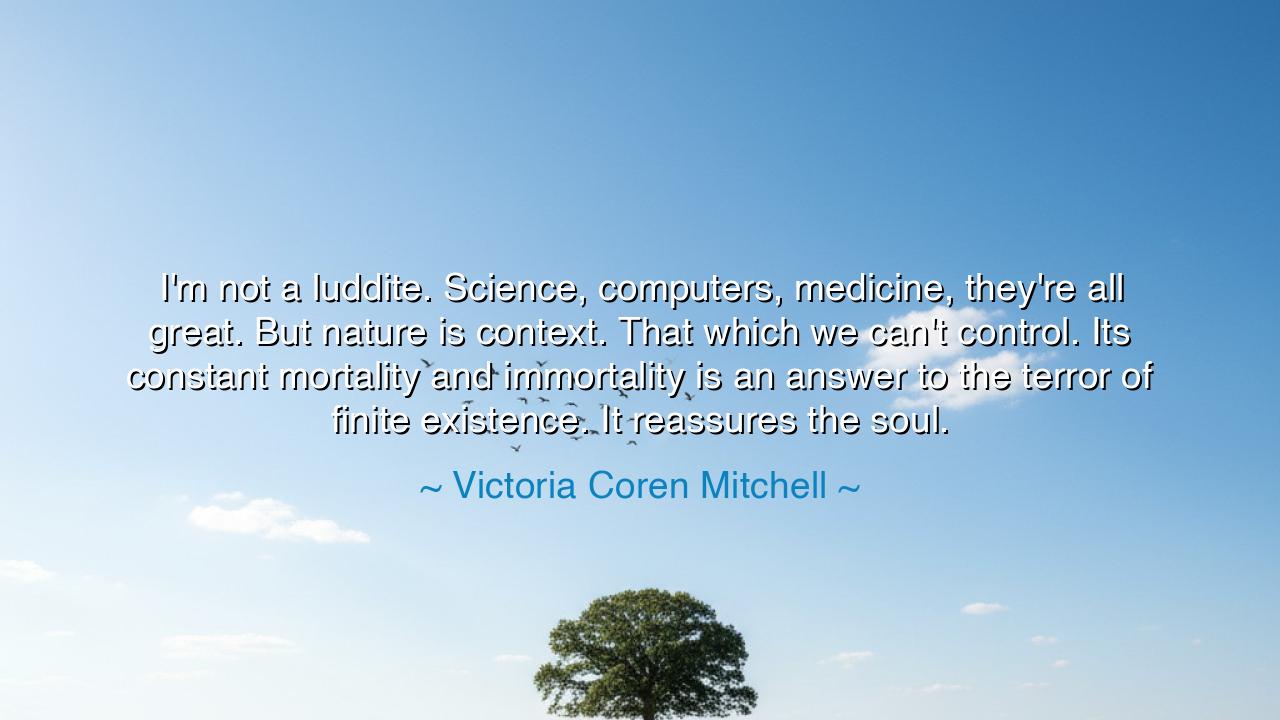
I'm not a luddite. Science, computers, medicine, they're all
I'm not a luddite. Science, computers, medicine, they're all great. But nature is context. That which we can't control. Its constant mortality and immortality is an answer to the terror of finite existence. It reassures the soul.






The words of Victoria Coren Mitchell—“I'm not a luddite. Science, computers, medicine, they're all great. But nature is context. That which we can't control. Its constant mortality and immortality is an answer to the terror of finite existence. It reassures the soul.”—speak to the eternal tension between human mastery and the sublime unpredictability of the natural world. She honors the gifts of human ingenuity—science, technology, medicine—while reminding us that our ultimate understanding, our deepest peace, comes from recognizing the vast, uncontrollable rhythms of nature. In these rhythms, life and death, growth and decay, mortality and immortality, all coexist, offering a solace that no machine or calculation can replicate.
Coren Mitchell’s reflection emphasizes that control has limits. Humans may map genomes, build cities, and send machines into orbit, yet the forest grows, the storm rages, and life follows cycles far beyond our manipulation. Nature, in its constancy and unpredictability, provides a framework for understanding existence. Its “constant mortality and immortality” reminds us that death is natural, yet life persists beyond each individual, reassuring the soul that our brief span is part of something infinite. This perspective is ancient, rooted in the teachings of philosophers and poets who recognized that true wisdom comes from aligning oneself with forces greater than oneself.
The origin of this quote lies in Coren Mitchell’s contemplation of the balance between human innovation and natural law. She acknowledges the marvels of modern achievement—computers that calculate, medicines that heal, science that probes the cosmos—yet she warns against the illusion that we are sovereign over life. Nature, she implies, is the ultimate teacher: it is context, a mirror reflecting both the fragility and the endurance of existence. By embracing the uncontrollable, we confront the terror of mortality with humility and clarity.
History provides countless examples of this principle. Consider Galileo, who faced the machinery of the Church and the rigid beliefs of his age. His instruments, telescopes, and calculations revealed truths about the heavens that humans could not control, yet in observing them, he glimpsed the sublime order of the universe. The stars, moving according to laws greater than any individual, offered both awe and reassurance—an echo of Coren Mitchell’s claim that nature consoles the soul by placing our lives in a broader context.
There is also a philosophical resonance with Marcus Aurelius and the Stoics, who taught that the serenity of the soul comes from accepting what lies beyond our power. Nature’s cycles, its inevitable birth and decay, are not obstacles but teachers. By witnessing them, humans learn patience, perspective, and humility. Coren Mitchell reminds us that despite the power of computers and medicine, true reassurance comes not from controlling outcomes but from observing the eternal flow, from aligning our lives with the rhythms of life itself.
Her words also emphasize the interplay of mortality and immortality. Each life is finite, yet each cycle of growth and decay, each tree that falls and seed that grows, each river that carves valleys over centuries, embodies a continuity that surpasses individual existence. In witnessing nature, we encounter both the brevity of our days and the enduring pulse of life, a duality that reassures, humbles, and inspires. This recognition offers peace: the terror of our finite existence is tempered by the immortality embedded in the larger web of life.
The lesson in her words is timeless: human innovation and technology, while remarkable, cannot replace the wisdom of nature. We must embrace both achievement and surrender, intellect and observation, invention and humility. By observing the natural world, we learn patience, reverence, and the truth that our lives, though brief, are meaningful within a greater tapestry. True reassurance and serenity arise from this dual understanding: mastery over tools, and acceptance of the uncontrollable.
And so, my children, remember this eternal truth: the soul is calmed not by domination of the world but by communion with it. Honor science, embrace innovation, heal the body, expand the mind—but never lose sight of the context of nature, its constant cycles of life and death, its mortality and immortality. In doing so, you find not only understanding but solace, and in that solace, a wisdom older than humanity itself, offering guidance, courage, and reassurance to face the fleeting brilliance of life.






AAdministratorAdministrator
Welcome, honored guests. Please leave a comment, we will respond soon